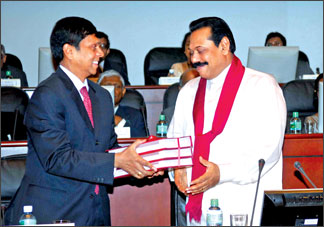Large scale infrastructure projects will continue despite terrorism
- President
‘Country and economy will be protected’:
By Surekha Galagoda
[email protected]
|

Governor of the Central Bank, Ajith Nivard Cabraal presents the
2007 Central Bank Annual Report to President Mahinda Rajapaksa
at the Central Bank auditorium on Tuesday.
Picture by Chandana Perera.
|
President Mahinda Rajapaksa said the government will continue to
invest on large scale infrastructure projects while eradicating
terrorism whatever challenges or problems we have to face as we are
bound to protect the country and the economy.
President Rajapaksa who is also Finance Minister was speaking at the
presentation of the 58th Central Bank Annual Report for 2007.
The President said that by showcasing a problem of human rights some
quarters are trying to stop the special tax concessions such as GSP+
which the apparel sector enjoys when they export to the European Union.
We know that there are some politicians and supporters of terrorists
who are behind this move.
We as a government are trying our best to get the concessions but it
will not be at the stake of our country’s sovereignty. Therefore, for
some reason if the apparel sector doesn’t get the benefits they will
have to increase productivity and learn to face the challenges.
The country is faced with the dual challenge of maintaining a high
growth rate while passing on the benefits to the rural folk which has to
be done parallel.
In addition we have the challenge of wiping out terrorism from this
country. The President paid tribute to all who sacrificed their lives
including Minister Jeyaraj Fernandopulle. He said that if somebody were
to think that these will scare us they are wrong as we will never step
back.
Governor of the Central Bank, Ajith Nivard Cabraal said that globally
too economies are in crisis due to the sub prime crisis and the turmoil
in the financial markets which has put several banks in trouble. The
Bank of England had to provide 37 billion sterling pounds to save the
United Kingdom’s Northern Rock bank from crashing.
He said that last year the economy recorded a growth of 6.8 per cent
for the third consecutive year for the first time since Independence,
demonstrating that the country has now moved on to a higher growth path
of above 6 per cent per annum from the historic average of around 4-5
per cent.
The annual average rate of unemployment reached its lowest ever
recorded level of 6.0 per cent, while the per capita income rose further
to US dollars 1,617 in 2007.
This performance is commendable, as it was achieved in a challenging
environment of heightened security concerns arising from intensified
terrorist activities and rising petroleum and commodity prices in
international markets which threatened the achievement of price
stability.
He said that the economic growth in 2007 was mainly driven by the
performance in industry and services sectors which grew by 7.6 per cent
and 7.1 per cent, while the agriculture sector grew moderately by 3.3
per cent.
The services sector made the biggest contribution of 62 per cent to
overall growth, while the industry and agriculture sectors contributed
32 per cent and 6 per cent. The shares of GDP from the services,
industry and agriculture sectors remained almost unchanged at 60 per
cent, 28 per cent and 12 per cent.
The Governor said that in 2007, most of the sub-sectors in
agriculture achieved relatively high growth rates except for tea and
paddy.
Tea production decreased by 2.0 per cent to 305 million kilograms,
while paddy production declined by 6.4 per cent to 3.1 million metric
tons. Continuous efforts to enhance the quality of Sri Lanka’s tea,
higher global demand and increased value addition led tea prices to rise
well above the global average price, offsetting the decline in
production in 2007.
Rubber production benefited from attractive prices, combined with the
adoption of new technologies. Coconut production rose by 3.0 per cent
during the year benefiting from favourable weather conditions but the
prices of coconut and coconut based products increased sharply
reflecting the world trend of increasing demand for organic oils to
produce bio-fuel as a supplement to expensive fossil fuel.
Director of Economic Research Dr P.N. Weerasinghe said that more
efficient provision of services by State Owned Enterprises (SOEs)
without being a burden on the public is a prerequisite for macroeconomic
stability.
A major source of macroeconomic imbalance has been arising from
inefficient operations of SOEs, in providing utility services such as
electricity, water, transport services, petroleum products and marketing
services such as purchasing paddy and selling essential commodities
through state owned marketing networks.
Such SOEs burden the public by their reliance on budgetary financing
or bank borrowings.
In addition to the policy of non-privatisation of existing
enterprises, there is a recent trend of the government venturing into
new SOEs or reviving hitherto troubled SOEs, eg., Mihin Air, the Central
Transport Board (CTB), Paddy Marketing Board, Co-operative Wholesale
Establishment (CWE) and Co-operative marketing networks.
It is essential that proper governance and pricing structures are
established in managing those SOEs if they were to achieve the intended
objectives through commercially viable operations without relying on
government subsidies.
Dr. Weerasinghe said that bringing down inflation to a single digit
from the current high levels would be a challenging task in view of
rising commodity prices in international markets.
The Central Bank in its “Road Map for Monetary and Financial Sector
Policies for 2008 and beyond” has announced strategies to bring down the
inflation rate to around 10-11 per cent by end 2008. |
